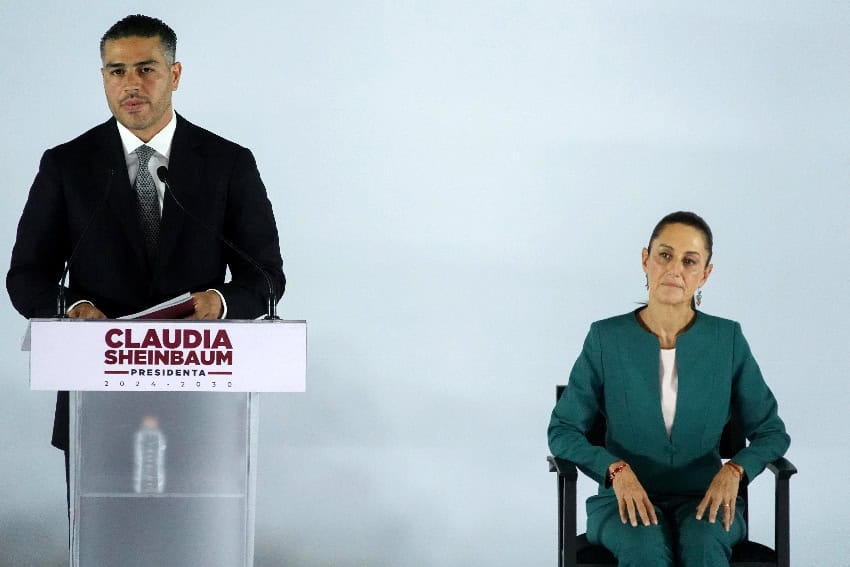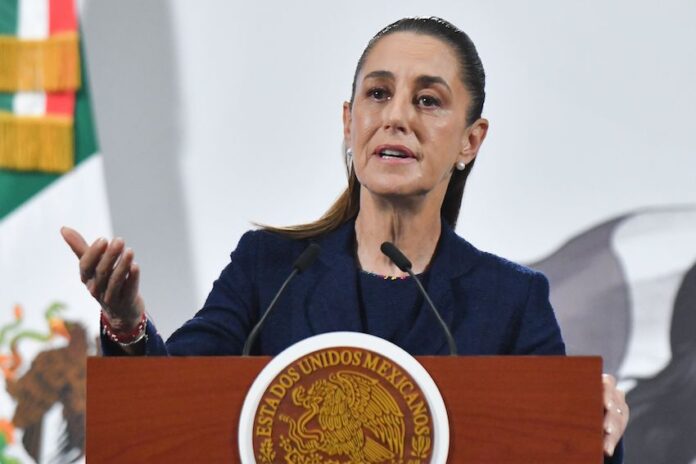The federal government’s security strategy and water concession irregularities were among the topics President Claudia Sheinbaum spoke about at her Wednesday morning press conference.
Here is a recap of the president’s Sept. 24 mañanera.
Sheinbaum responds to US ambassador’s praise for her security strategy
A reporter noted that the United States Ambassador to Mexico Ronald Johnson commented on the Mexican government’s security strategy on Tuesday.
Johnson, who was sworn in as U.S. ambassador to Mexico in May, said that the Sheinbaum administration has made a “bold change” in security strategy in Mexico by ramping up operations against drug cartels.
His remarks came during a conference in Washington, D.C., organized by The Heritage Foundation and the America First Policy Institute.
There doesn’t appear to be any publicly available video or transcript of Johnson’s remarks, but according to a Reforma newspaper report, the ambassador spoke positively about security collaboration between Mexico and the United States, and declared that “a new era of cooperation between our governments” has commenced.
Johnson also compared the current security strategy in Mexico to the “more passive” approach of the administration led by former president Andrés Manuel López Obrador (AMLO), who championed a so-called “hugs, not bullets” strategy.
Asked about the ambassador’s remarks on Wednesday morning, Sheinbaum rejected that her government has made major modifications to the security strategy of AMLO’s administration.
“You already know that when they want to differentiate us, we don’t allow it because we are a project,” she said, a tacit acknowledgement that the current Morena party government represents continuity with the previous Morena party government.
“There is an intention, I don’t know whether it is of the ambassador, I’m not going to attribute it to him, … but there is an intention of the commentators from … [Mexico] to create the condition so that I could say: ‘No, we are different,'” Sheinbaum said.
“What are they looking for? A division within our movement,” she said, referring to the Morena party and the so-called Fourth Transformation political project she leads.
“There will never be that because, in addition, we recognize the work of [former] president López Obrador in all its magnitude,” Sheinbaum said.
“… I wouldn’t say there is a distinction [in security policy]. Rather, we made the decision for there to be greater investigation and intelligence from the Ministry of Security and Civilian Protection,” she said.
“… The attention to the causes [of crime] continues,” Sheinbaum said, referring to the “hugs” aspect of the security strategy implemented by AMLO, which includes welfare payments and social programs.
She also said that there is now “perhaps greater coordination” on security issues between authorities of different levels of government.
“It’s a next stage [of the security strategy],” Sheinbaum said, adding that there are no grounds to say there is a “rupture” with AMLO’s security approach or a “new strategy.”
“We’re simply strengthening certain areas that we felt needed to be strengthened,” she said.
Since early in Sheinbaum’s administration, there have been claims that her government is abandoning the “no bullets” part of AMLO’s strategy because it appears to be more prepared to fight fire with fire, so to speak, as it seeks to combat drug cartels and the narcotics they transport to the United States.
Since President Donald Trump took office in January, the United States’ pressure on Mexico to do so has intensified, and Sheinbaum — who is determined to protect trade with the U.S. as much as possible — is widely considered to be receptive to U.S. demands, although she stresses that she always acts in Mexico’s best interests and frequently defends Mexican sovereignty.
In addition to arresting over 30,000 alleged perpetrators of high-impact crimes in the past year, the Mexican government has seized large quantities of narcotics, dismantled clandestine drug labs, confiscated more than 16,000 firearms and sent 55 cartel figures to the United States to face justice.

Murders are down and data on drug seizures and migrant arrests at the Mexico-U.S. border indicate that the quantity of narcotics being shipped north, and the number of migrants attempting to enter the U.S., have declined.
While the United States continues to impose so-called “fentanyl tariffs” on imports from Mexico that don’t comply with USMCA rules, Secretary of State Marco Rubio said in Mexico City earlier this month that the current security cooperation between the United States and Mexico is the “closest … we have ever had, maybe with any country.”
In contrast, the United States’ former ambassador to Mexico, Ken Salazar, asserted last November that the “hugs, not bullets” security strategy failed, and blamed AMLO for a breakdown in bilateral security cooperation. Salazar was ambassador for more than three years while Joe Biden was in the White House.
‘You can’t do everything in 6 years’
A reporter asked the president how the number of “inconsistencies” in water concessions in Mexico was able to grow to more than 52,000, a figure cited by a senior National Water Commission (Conagua) official in an interview with the newspaper El Universal.
Conagua’s deputy director for water management, Mauricio Rodríguez Alonso, said that the federal agency had detected cases in which water was being exploited by people whose concessions were no longer valid, as well as cases in which water was being used for purposes unrelated to the applicable concession.
Sheinbaum said that during a period of “many years,” previous governments “didn’t want” to put the concessions “in order.”
She said that AMLO told her that his government didn’t have the time to do a lot of things he would have liked to have done.
“Just imagine, 36 years of neoliberalism, plus the corruption that came before,” Sheinbaum said, referring in the first instance to the period between 1982 and 2018.
“You can’t do everything in six years,” she said.
“So we, I, took the decision, when we arrived to put the concessions in order. And the truth is that [Conagua director] Efraín [Morales], Mauricio and the entire [Conagua] team has done an extraordinary job,” Sheinbaum said.
By Mexico News Daily chief staff writer Peter Davies ([email protected])
